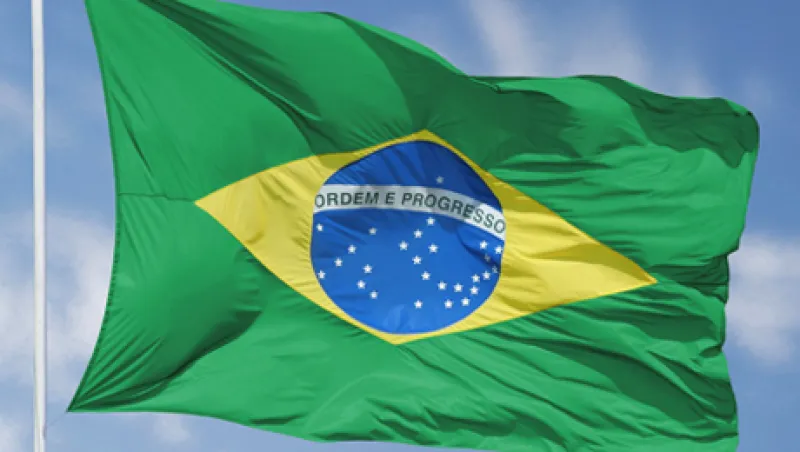Investing in Brazil has become a lot more challenging this year as the stock market has fallen, but a fundamental change in the country’s economic environment could be opening the door for new opportunities, asset managers say.
A historic decline in interest rates is forcing most Brazilian investors to change their behavior. Traditionally, investors have placed the bulk of their funds in government bonds and other fixed-¬income products to take advantage of the country’s high interest rates, a legacy of the hyper¬inflation of the 1990s. But Banco Central do Brasil has been cutting rates aggressively over the past year in a bid to weaken the real. Since August 2011 the central bank has slashed its benchmark Selic rate by 400 basis points, to a record low of 8.5 percent. With the economy slowing and inflation expectations falling, analysts anticipate further cuts. The interest rate futures market indicates that the Selic could fall to 7.5 percent by the end of the year.
Brazil’s financial community is abuzz with talk that the country is on the verge of a normalization of rates that could force investors to diversify their holdings.
“The drop in rates is having a huge impact on institutional investors in particular,” says Carlos Rocha, head of asset management at Plural Capital, a São Paulo–based hedge fund firm. “It is becoming hard for them to meet their actuarial targets of the consumer price index plus 6 percent. They are having to take on more risk to meet the returns they seek.”
Ordinarily, declining rates would be good for equities and might be expected to prompt Brazilian investors to increase their modest equity allocations. Brazil’s stock market has been hammered by the sluggish economy, though. The Bovespa plunged 15.7 percent in the second quarter, its worst quarterly performance since the fourth quarter of 2008. The index was down 4.2 percent for the first six months of the year.
In this environment most investors are looking for alternatives. Retail investors are tending to stick with tried-and-tested fixed-income products, but some are moving away from money market funds managed by the big banks because of their high management fees, says Allan Hadid, chief executive officer of BRZ Investimentos, a São Paulo–based alternative-asset manager that oversees $2 billion. “They are going into time deposits and other bank products linked to interest rates but not entailing a management fee,” he says. At the same time, many institutions are shifting from fixed income to equities or alternative investments such as private equity, hedge funds and private credit funds, Hadid adds. “Investors are moving away from boring, indexed products toward more stock-picking-orientated funds,” he says. “They seek alpha, and there are a lot of good stocks to pick that fall under the radar of the index.”
Although the Brazilian market has been volatile, the asset management industry has been relatively stable over the past year with no changes in rank among the top five.
BB Gestão de Recursos, part of state-owned Banco do Brasil, remains in first place on the Brazil 20, Institutional Investor’s fifth annual ranking of the country’s largest fund managers.
The firm saw its assets under management rise to $242.2 billion as of March 31, up 30 percent from a year earlier.
Itaú Unibanco Asset Management follows in second place, with $175 billion in assets, up 14.1 percent.
Third-place Bradesco Asset Management increased its assets by 10.7 percent in the year, to $136.9 billion.
Among notable advances in the ranking, BTG Pactual rises one spot, to sixth place. It had assets of $51.8 billion at the end of March, up 17 percent from a year earlier. Credit Suisse Hedging–Griffo Asset Management jumps two places, to eighth, after a 25.2 percent rise in assets, to $30.5 billion.
To be sure, investment managers face a much tougher climate today than the one that prevailed over the past decade, when the economy and markets boomed. Last year’s surge in the real and a recent slowdown in demand from China for Brazilian commodities have hit the economy hard. At the end of June, the central bank trimmed its growth forecast for 2012 to 2.5 percent from 3.5 percent. Private economists are more bearish still, predicting growth of just over 2 percent, according to a central bank survey. As a result, most industry executives believe that the growth of assets will slow down from the breakneck pace of recent years.
Lower interest rates should help stabilize the economy, though, and force investors to pursue more active strategies to generate returns, says Gustavo Murgel, head of asset management at Itaú Unibanco in São Paulo.
“At last, Brazil is lowering its interest rates,” he says. “This will force the industry to change in two ways. Firstly, investors will look for higher yield and be prepared to run more risk. Secondly, there will be a movement away from money market funds and short-term overnight deposits to more ¬medium- and long-term products.” Lower rates also should lead to an eventual rise in allocations to equities, which currently average just 10 percent across the industry, Murgel says.
Marco Geovanne, Rio de Janeiro–based executive director of Previ, the pension fund for Banco do Brasil employees, says he believes interest rates could be headed to 8 percent or even as low as 7.5 percent. Such a drop would have important consequences for pension funds, he notes. Previ is currently well funded, with some 150 billion reais ($74 billion) in assets for 90 billion reais in liabilities, but every 100-basis-point decline in interest rates effectively increases the fund’s liabilities by more than 10 billion reais, he says.
Notwithstanding the equity market’s recent weakness, Geovanne expects lower rates to push more investors into the equity market in the long run. He also says Previ is looking to increase the share of corporate bonds in its fixed-income holdings in a search for yield. Such bonds now account for about 2 percent of the fund; government bonds make up the vast majority of Previ’s 30 percent fixed-income weighting.
Today’s low-rate environment should also spur the growth of alternative asset classes, executives contend.
Itaú Unibanco’s Murgel says private equity is about to take off in Brazil. Not only are institutional investors pouring into the market, but family offices and wealthy individuals are also keen to participate. With the turbulence in financial markets drying up the flow of initial public offerings, medium-size companies are increasingly turning toward private equity firms for capital, he adds.
“We are seeing a sophistication of the private equity industry in the country, with funds being set up dedicated to specific industries, for example, oil and gas,” Murgel says. In addition, pension funds are forming club deals to back private equity investment in infrastructure projects.
Itaú Unibanco is looking to reinforce its investment capabilities to face an anticipated increase in competitive pressures. Murgel says the firm is aiming to hire experienced portfolio managers. It has also launched five new exchange-traded funds on Brazilian stocks in the past 15 months in a bid to entice clients away from money market funds.
“I think we will see the market divide between two types of player: the big asset managers, including banks, that cover a wide range of products, and the niche, specialist players,” he argues.
The movement by investors toward alternative investments has encouraged asset managers to set up more specialist funds. Alternative managers such as Claritas Investimentos, Lacan Investimentos, Triscorp Investimentos and Visium Asset Management have all established timber funds that invest in eucalyptus plantations, which are springing up in the cerrado, the vast savanna lands of south-central Brazil, and in the states of Maranhão in the northeast and Tocantins in the middle of the country. Eucalyptus can be harvested in Brazil after only seven years of cultivation, compared with up to 30 years in Canada and 45 years in Japan, according to Fides Asset Management, a Rio-based manager with 280 million reais in assets. Eucalyptus plantations can generate annual returns of inflation plus 12 to 15 percent a year, Fides claims. “The land is very cheap in those areas,” says Otávio Vieira, a partner at the firm.
Some 50 boutique fund managers have set up shop in Rio de Janeiro during the past five years, turning the city into the Brazilian equivalent of Greenwich, Connecticut, says Plural’s Rocha. These new players are not attracting much backing from institutional investors, who seek managers with critical mass, he adds. As a result, the sector appears to be ripe for consolidation.
Plural is certainly eager to be a consolidator. In May the firm acquired Geração Futuro, a Brazilian brokerage with more than 80,000 clients and 6 billion reais under management, for 150 million reais. The purchase raised Plural’s total assets to some 10 billion reais, including 1.5 billion reais at its wealth management arm.
The firm has also been quick to introduce products for investors looking to boost yield in today’s low-rate environment. Last year Plural launched its Plural Capital ¬Fornecedores Petrobras fund, which invests in receivables of Petróleo Brasileiro, the giant state-controlled Brazilian oil company. By effectively providing credit to Petrobras suppliers, the fund has been able to generate a return of roughly 150 percent of Brazil’s Selic short-term rates, or about 15 percent, since inception in July 2011. Rocha says investors regard Petrobras as having less risk than the Brazilian government, so the fund is able to provide high returns with a high level of security. The vehicle has been popular with institutional investors and now stands at 222 million reais. • •






